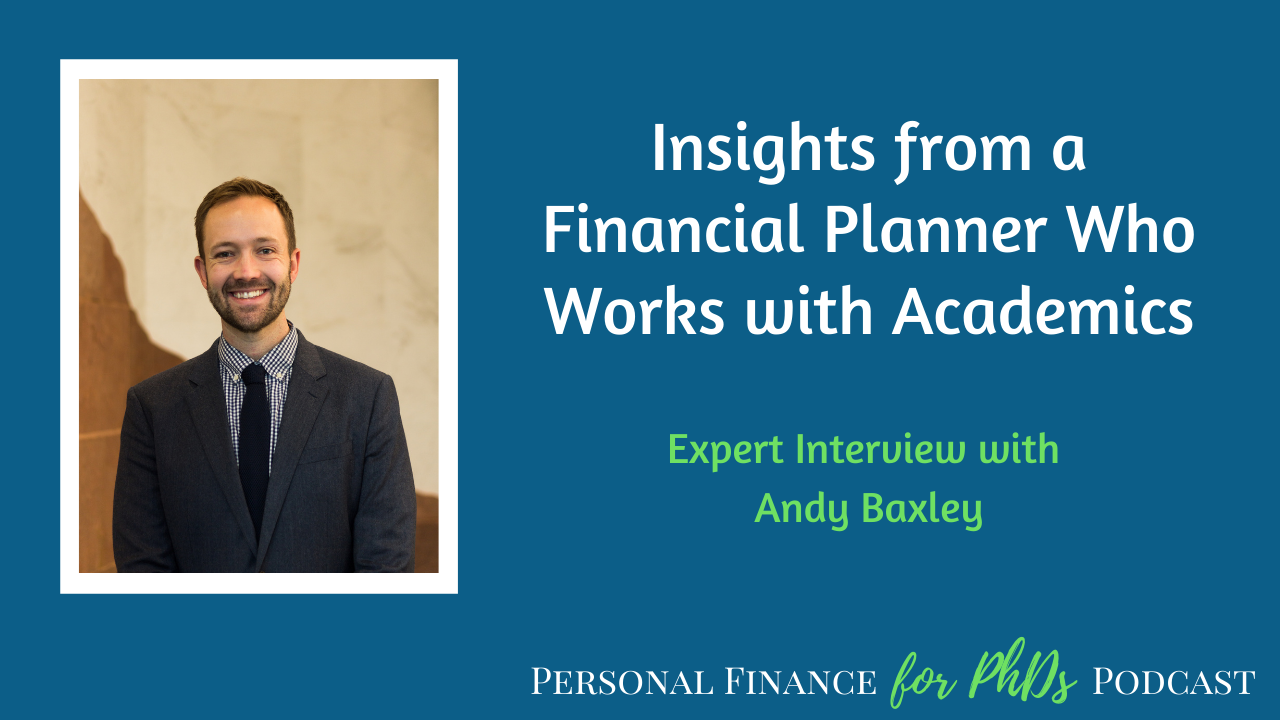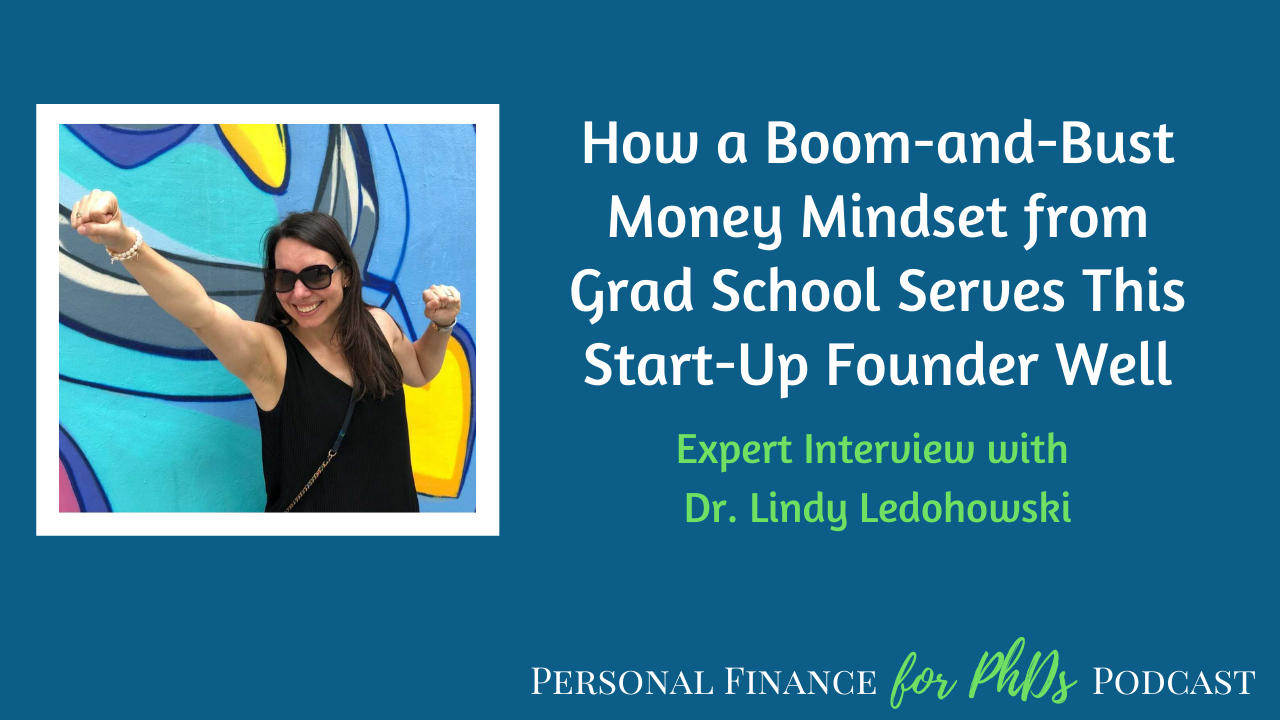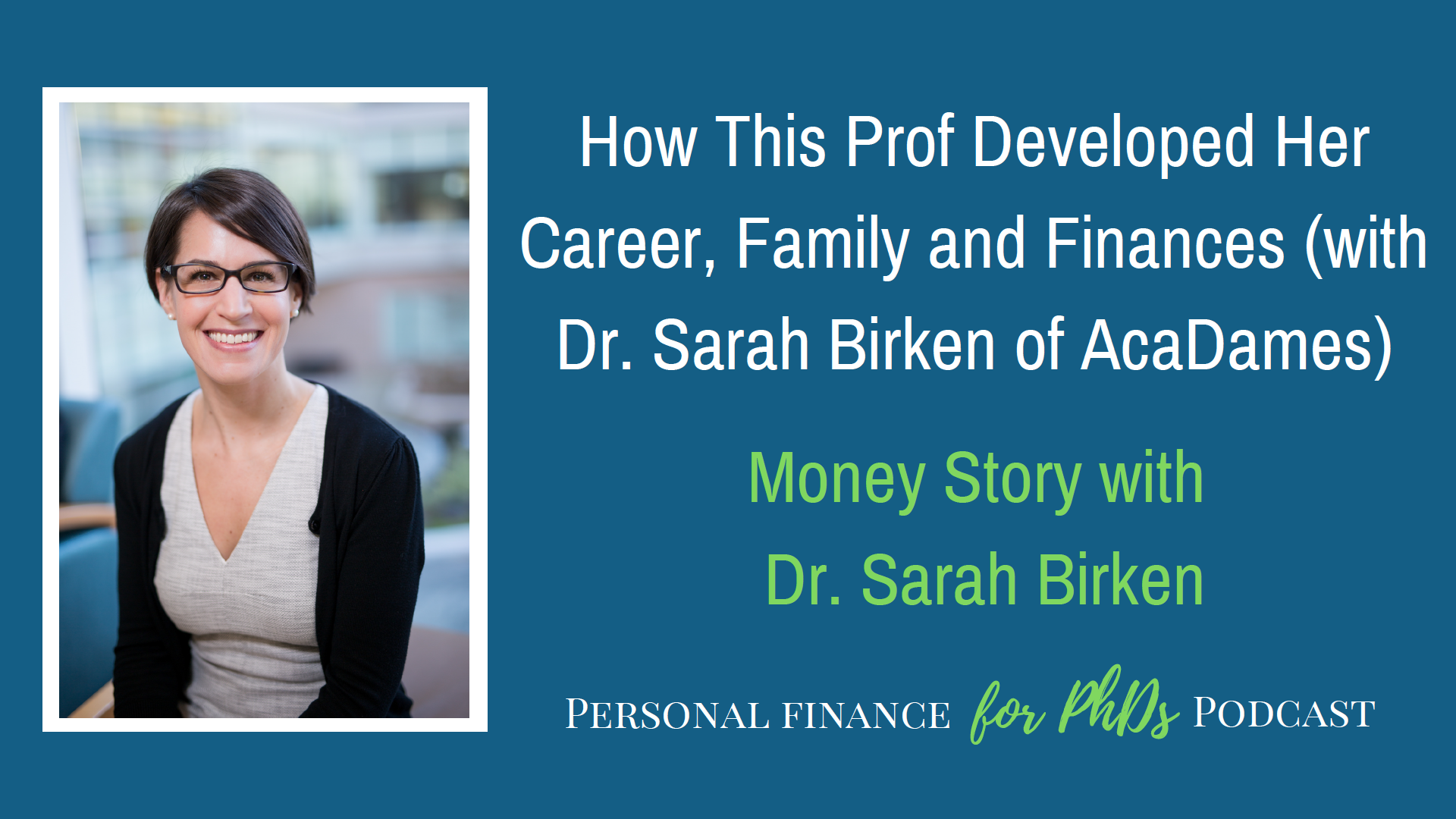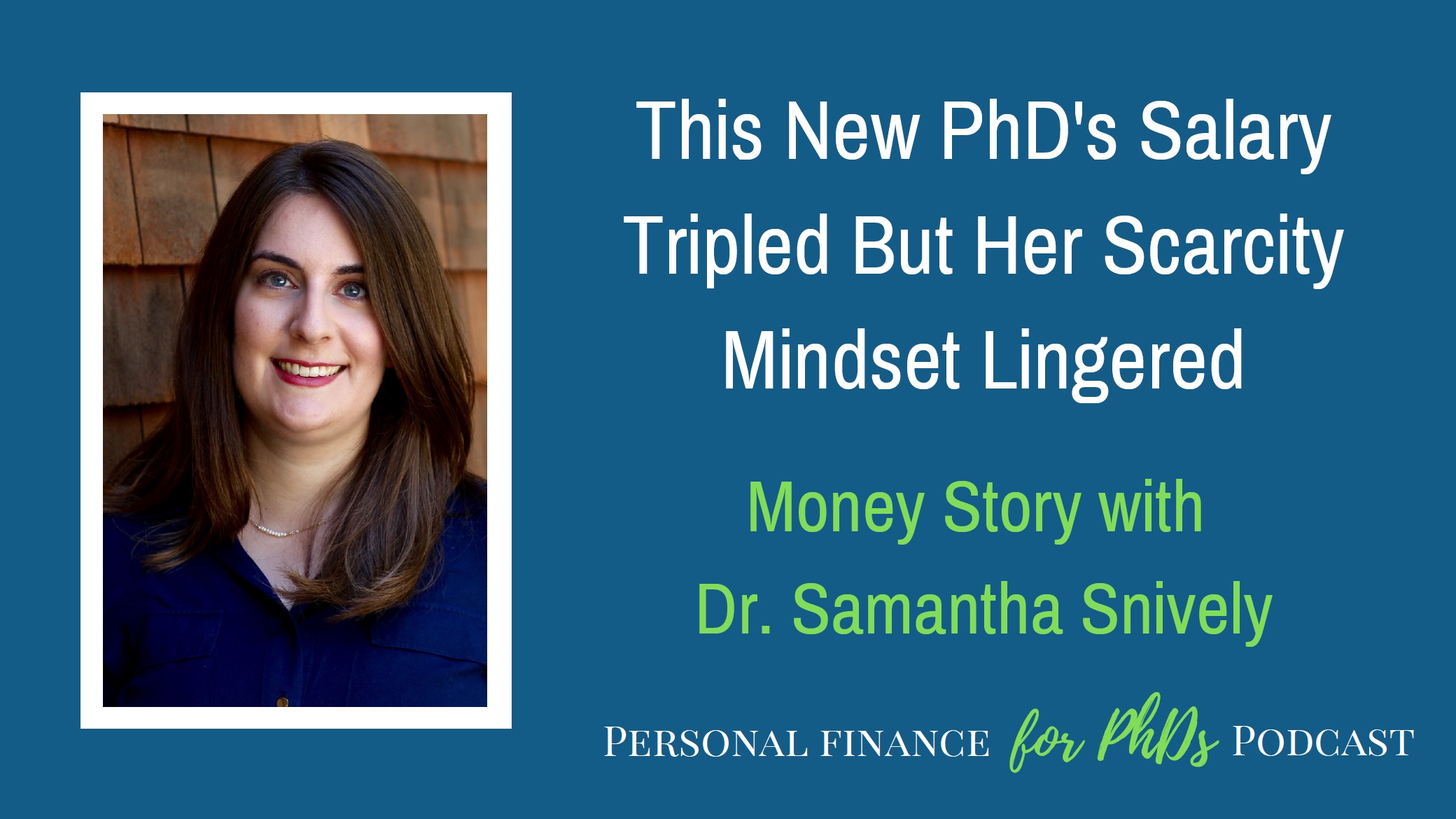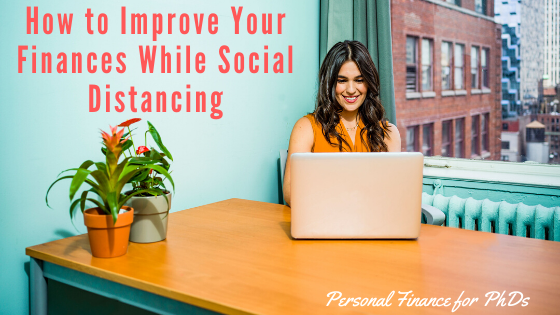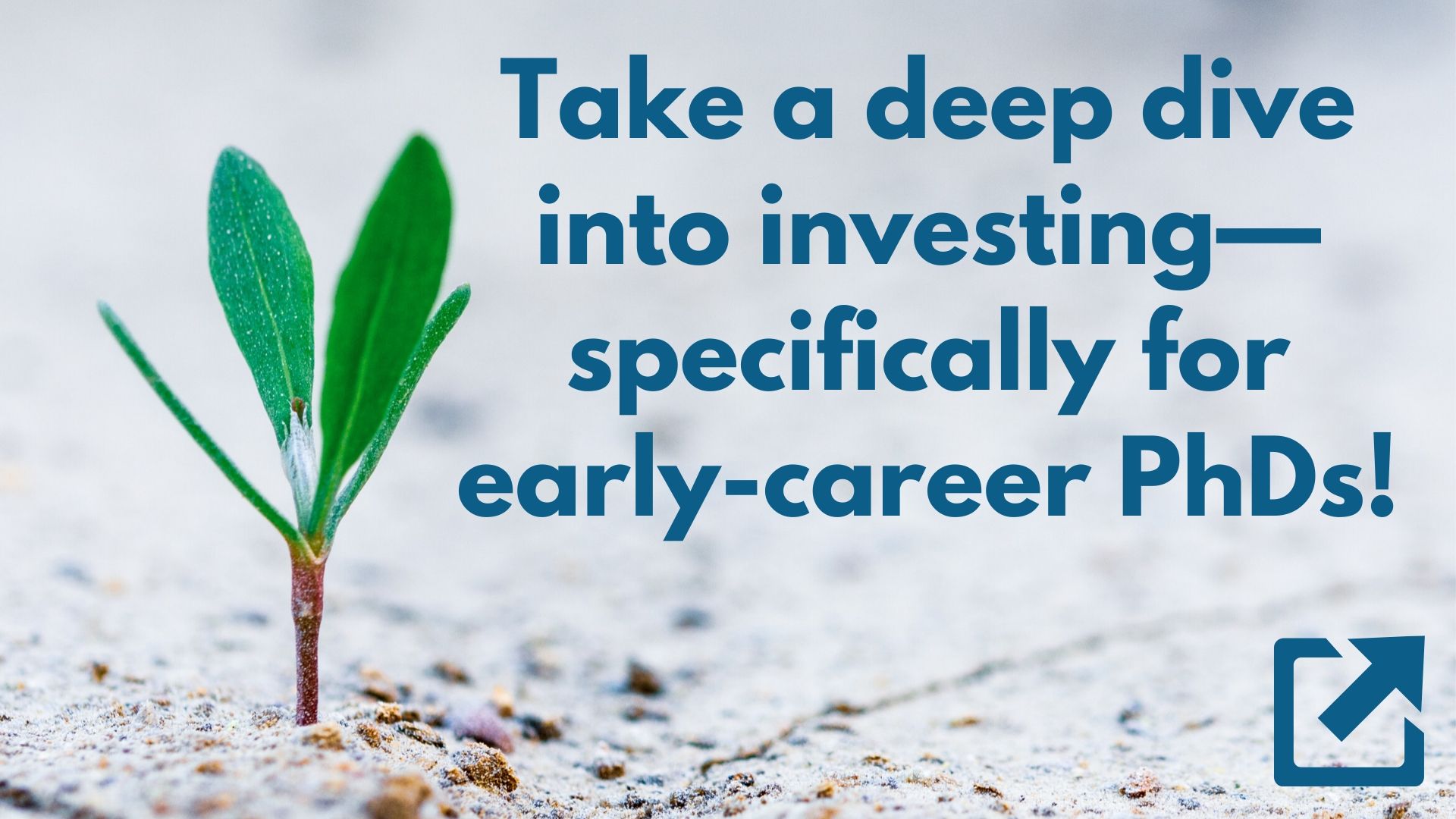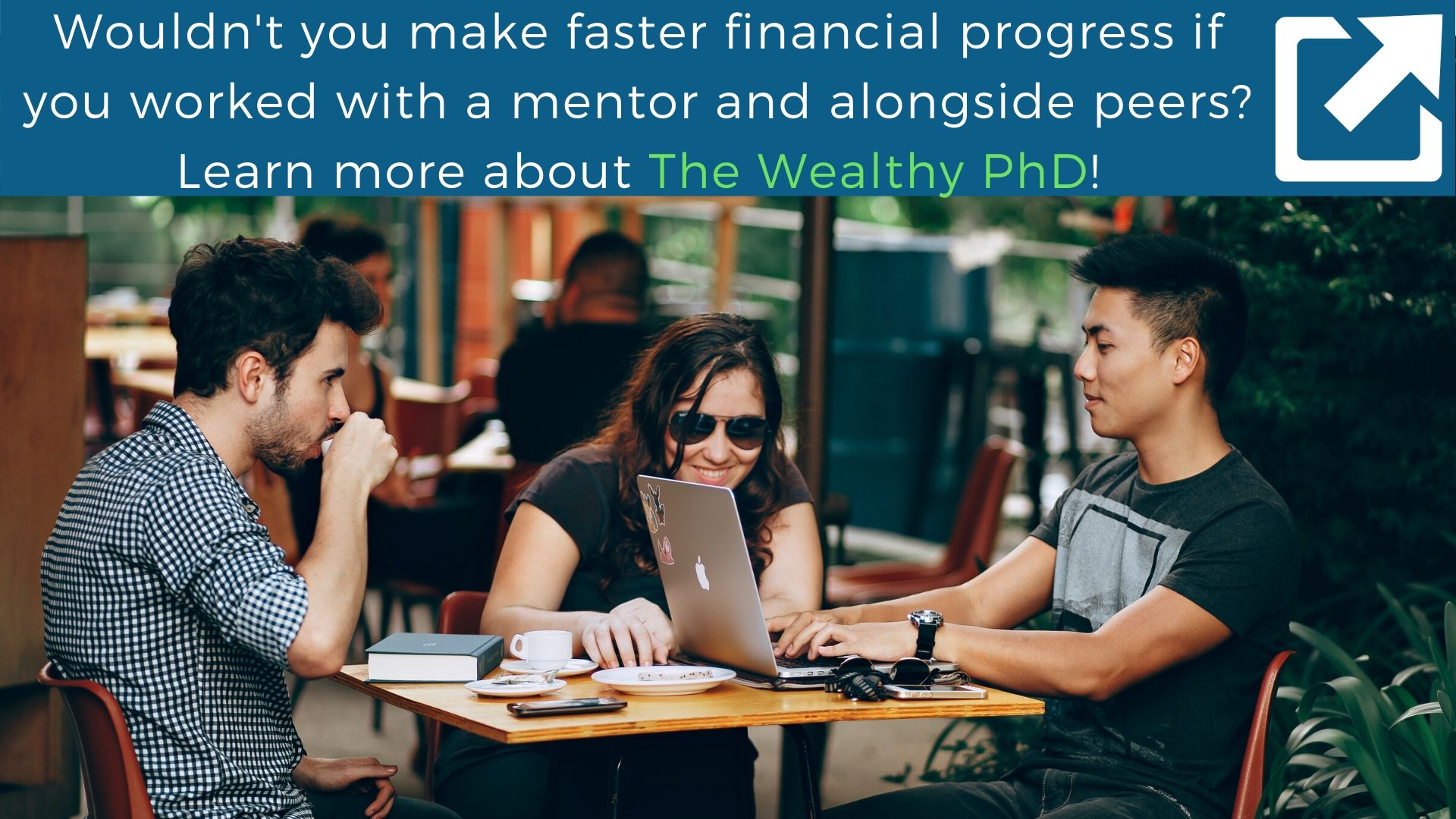In this episode, Emily interviews Dr. Chris Caterine, the author of Leaving Academia: A Practical Guide. Chris holds a PhD in classics and worked as a visiting assistant professor before transitioning into a career in the private sector. Leaving Academia addresses the necessary identity shift and practical steps that accompany this process and grew out of the informational interviews Chris conducted. Emily and Chris discuss the financial pressures that motivated Chris to shift to a non-academic career and how to financially prepare for that change. They also discuss the role side hustles and volunteer experiences can play in helping you land a non-academic job. This episode is a must-listen for anyone currently in PhD training or working in academia!
Links Mentioned in the Episode
- Leaving Academia: A Practical Guide (Book by Dr. Chris Caterine)
- Dr. Chris Caterine’s Website
- PhDStipends.com
- PostdocSalaries.com
- PF for PhDs S3E6: How Finances During Grad School Affected This PhD’s Career Path (Money Story with Dr. Scott Kennedy)
- PF for PhDs: Community
- Salesforce.com
- PF for PhDs S3E10: This PhD Developed His SciComm Career Through Side Hustling (Money Story with Dr. Gaius Augustus)
- Dr. Chris Caterine Twitter
- Dr. Chris Caterine LinkedIn
- PF for PhDs S2E7: How to Successfully Plan for Retirement Before and After Obtaining Your PhD (Expert Interview with Dr. Brandon Renfro)
- PF for PhDs: Podcast Hub
- PF for PhDs: Subscribe to Mailing List
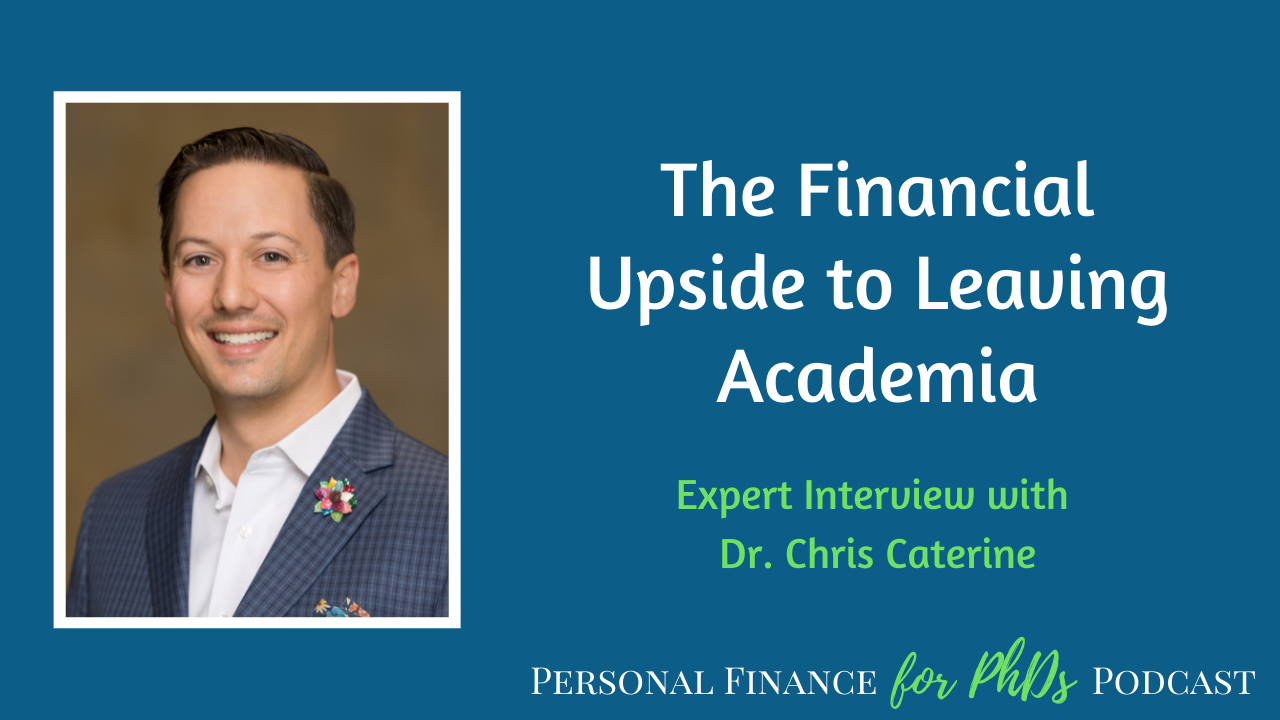
Teaser
00:00 Chris: And when I really stared down that fact it became very, very hard for me to cling to this idea that it’s okay to accept a certain degree of poverty or lack of wealth in being an academic. And to really say, you know what, like actually, I want to have some nice things and I’m not sure I’m willing to be ashamed of that anymore.
Introduction
00:27 Emily: Welcome to the Personal Finance for PhDs Podcast: A Higher Education in Personal Finance. I’m your host, Dr. Emily Roberts. This is Season 10, Episode 7, and today my guest is Dr. Chris Caterine, the author of Leaving Academia: A Practical Guide, which was published one year ago. Chris holds a PhD in classics and worked as a visiting assistant professor before transitioning into a career in the private sector. Leaving Academia addresses the necessary identity shift and practical steps that accompany this process and grew out of the informational interviews Chris conducted. Chris and I discuss the financial pressures that motivated Chris to shift to a non-academic career and how to financially prepare for that challenge. We also discuss the role side hustles and volunteer experiences can play in helping you land a non-academic job. This episode is a must-listen for anyone currently in PhD training or working in academia!
01:29 Emily: Did you know that I run a couple of database websites for collecting stipend and salary information for PhD trainees? The domains are PhD Stipends dot com and Postdoc Salaries dot com. If you haven’t done it yet, would you please take a minute to: 1. Fill out the survey to report your 2021-2022 stipend or salary to the appropriate website? The databases consist of crowd-sourced information, so they rely on the willingness of PhD trainees like you to self-report their income. 2. Share the site with your peers over a social network, a listserv, or a forum website? These websites are super useful for prospective PhD students and postdocs, but they are also often used for advocacy efforts to bolster the case for raising stipends and salaries. Thank you so much for participating in these efforts! Without further ado, here’s my interview with Dr. Chris Caterine.
Will You Please Introduce Yourself Further?
02:32 Emily: I am delighted to have joining me on the podcast today, Dr. Chris Caterine. He is the author of the new book, Leaving Academia: A Practical Guide, and I’m super delighted to have him on because we’re going to be talking about career changes, graduate students, and PhDs and academics who are leaving academia and how personal finance relates to that process. So I’m super excited. Chris, will you please introduce yourself a little bit further for the audience?
02:56 Chris: Of course. Thank you so much for having me, Emily. Again, I’m Chris Caterine, I’m a communication strategist and proposal writer for a global consulting firm. My academic career was actually in classics, which is Greek and Roman literature history and all that stuff. I got my PhD in 2014 from the University of Virginia. And as Emily said, last year I had a book published called Leaving Academia: A Practical Guide with Princeton University Press.
03:20 Emily: Fabulous. And in the book, it talks a lot about your own journey, as well as what you learned from others. And there were lots and lots of interviews which went into the book, which was fascinating. Can you just tell us like quick synopsis, what’s the book about, what do you want the reader to do with it?
03:34 Chris: The book is really designed to do two things. The first thing is that I’ll go to the practical side, which is to say, if you are in academia and you realize that you don’t have a career, a future in academia, which, you know, 93% of entering social sciences and humanities graduate students don’t, then the book gives you practical steps, just put one foot in front of the other and figure out what you need to do to find a new career. Even if you have no idea what that’s going to be. And that practical side of the book again, is good for everybody, not just humanities and social sciences, but STEM folks as well. The other side of the book is almost more psychological or identity-driven. And that’s really trying to get into the mindset of people who can’t imagine having any career besides a professorship. And what sort of, how do you approach what is ultimately an identity crisis, not just knowing what you will do, but not knowing who you will be if you leave the academy. I think those tend to drive more towards the humanities and social sciences side because there’s always been more industry outs for people in STEM. But really it applies to anybody who views academia as vocation and feels called into that line of work and realized since then, that might not be their future.
04:50 Emily: I love the way you described that. And I also loved, I don’t remember if it’s the introduction or something, but you sort of positioned what your book adds to the field already, because I don’t know if I read some of the exact same books you’re referencing, but I read the kind of book that you’re referencing, which is like a lot of like personal essays or like individual stories around careers that people have after they, you know, get out of graduate school or finish their PhD. And that’s wonderful to see examples of what’s going on, but your book is more about, okay, what is the actual like logistically, like, what is the process here? Like what do I actually do to get to that end point that I see as possible? And I really appreciated that. And of course I love, and I’m sure everybody loves that these six chapters have alliteration for all the titles to them.
Motivation for Leaving Academia
05:32 Emily: So there’s, I’ll just read them out because I have the book here. Dread, discern, discover, decipher, develop, and deploy. And I actually found I thought my favorite parts of it were actually in decipher when you were talking about, I don’t know if you use this term, but the translatable skills that you develop in academia and how they actually relate to other jobs you could do later. And I know I’d always heard that in graduate school, you have translatable skills, you can use them later, but like your explanation was just more detailed than anything I’d read before, which I found really delightful, it made me feel a little bit better about the things that I learned while I was in academia. So thank you for that. So, delightful book, and as I said it’s, it was driven by all these informational interviews that you did. And you did more in-depth interviews for the book. But I wanted to know about sort of your motivation for leaving academia. And it’s apparent from the book that finance has played at least some role in that. So would you please elaborate on that?
06:32 Chris: Yeah, really, for me, I think I began accepting that I was going to be leaving academia around age 30. It sounds a little bit cliché, but it was a big transition point, even if I didn’t want to admit it. And I was getting to that stage of life where you know, my wife and I had been married for a few years. We were thinking that we probably wanted to start a family at some point. I just remember looking at all of these jobs I was applying to, you know, I was making $40,000 a year teaching a 3/3 as a visiting assistant professor. And I was applying for jobs like that, that were apart from my wife and I was saying, well, first of all, how do we have kids if we’re living apart, that’s really work. But also like just doing the math and the salary and trying to think, okay, if we’re trying to live in two places, that’s two households, 40, 50, even $60,000 a year like this, just like the math doesn’t work.
07:22 Chris: And on top of that, even if we lived in the same place somehow, you know, solved the two-body problem, because my wife is also an academic, or still is an academic. Even if we solve that, I looked at it and said, you know, I don’t know that my wife and I would be able to give any child or children in the future, anything resembling the quality of life that our parents gave us. And when I really stared down that fact, it became very, very hard for me to cling to this idea that it’s okay to accept a certain degree of poverty or lack of wealth in being an academic. And to really say, you know what, like brass tacks, actually, I want to have some nice things, and I’m not sure I’m willing to be ashamed of that anymore.
08:07 Emily: So interesting. I mean, really what you’re talking about here is a realization of your own values as you grew, you know, towards age 30 and so forth, and realizing that the career, which is one of your values, I’m sure that aligned in some way with your values was in conflict with these other values of what is the standard of living that I want? What is the kind of family that I want? And you resolved, I assume, this conflict by having a career outside of academia that still, again I’m assuming, fulfills many of your values and so forth, but this book is about the process of finding that and landing that career. I’m just wondering, because we’ve heard the story before, a similar story before on the podcast. I’ll refer listeners to the episode with Dr. Scott Kennedy, who similar to you, came into academia, aspiring to the professoriate.
Financial Framework in Grad School
08:51 Emily: And during graduate school got married and actually had, I think, two or three children during graduate school, and realized that it was just not tenable financially and exited academia and found fulfillment elsewhere. So that was a wonderful example, but I want to know. Okay. You just mentioned, you know, as a visiting assistant professor, the $40K salary. Did you know, like back when you were in graduate school, that that was your financial future, if you stayed in academia? Or did you have like a rosier picture? Like what did you think was going to happen?
09:18 Chris: Well, in grad school, I was living on an $18,000 a year stipend. So I figured anything more than that would make me rich. I mean, I literally just thought it’s double the buying power and of course that isn’t actually the case, you know, taxes increase. If you’re living with a partner, like maybe you have two incomes, but you need more space for the two of you. The costs do not kind of move up in a linear way. And so I sort of expected that as my salary went up, you know, in a linear way that the costs would track and they just don’t actually in a lot of ways. And so, I really worked hard to live on that, that $18K a year. You know, it’s funny, I was looking at my pandemic hair, which is getting all too long in the back and I was like, man it hasn’t been this long since graduate school.
10:03 Chris: And I’m like, oh yeah. Like I got one haircut a fiscal quarter for $12 at a place, you know, a 20-minute drive away because I wanted to not put money into that and save it for drinks out, whatever it was. And so I think I just assumed that like my spending was so low that anything that I brought in would let me do infinitely more. And part of that was I was living in a low cost area. And part of that was, I just didn’t understand how those costs scaled, and part of it was that, you know, at age 22 the prospect of kids was a long way off. And then you start thinking about it, you say, oh, I have 18 years to save, you know, $350,000 for college. That’s that’s not going to work right on $40 a year. The math just doesn’t track. So yeah, I think my thinking definitely changed later on. But in graduate school I just assumed that it would be okay.
Financial Strain as a Common Motivator
11:03 Emily: And I think that, you know, you said earlier, oh, it’s cliché approaching my 30th birthday, I had all these, you know, realizations or whatever. But I think that your story, again, is common that as we age, we realize that we want a higher standard of living than what we were enduring during graduate school. And the other thing, you mention this, I think, somewhere in your book that during graduate school, I don’t believe that you were contributing to your retirement. That was something you were able to do only once you had your full-time job and so forth. And so there’s also this like sort of deferred cost, like you’re pushing off responsibility to the future for yourself. And so, yeah, maybe $40K is not actually double $18 K because you have XYZ taxes and retirement and all these other things. Maybe a house, maybe a family, all these other things you want to do. So I totally understand. And it’s the same, you know, experience that I have as well. Do you find that financial strain in academia is a common motivator for leaving academia for other people?
11:59 Chris: Yeah. A lot of people that I’ve spoken with do raise that issue. And I would say that the stories vary a lot. These are some people who say I have a ton of debt, I have nothing in savings. And you know, I’m done with graduate school in three months. Can you help me. And that’s a big ask. You know, I can give advice. I can tell you maybe how to prioritize that three months that you have, but that’s a challenging situation. For other people they see it a little bit earlier on, and maybe they realize that things won’t work out financially, for other people, especially in the U.S., healthcare becomes an issue as well. I would say that that is a big motivating factor for a lot of people. And I think as you do get closer to completing, and as you start applying for jobs and thinking about you know, incurring the cost to move for a jobs that pays you $30,000 like that’s going to cost you a few thousand anyway, you’re kind of burning negative on that deal.
13:06 Chris: I think when people start actually thinking about that or trying it out a few times and seeing how it works out, yeah, the finances do become a big issue. And especially looking at salaries outside of the academy, it’s just wild. I mean, I felt rich when I went from my $18,000 to $40,000 as a visiting assistant professor. And I didn’t realize just how small a salary that was until I began looking outside.
Personal Finance Strain on Contingent Faculty
13:36 Emily: Yeah, my husband’s also PhD and he and I went through a similar thing going from like graduate student to postdoc salary, but then realizing, oh, wait, we’re paying FICA now. Okay. It doesn’t go that far. So I’m actually wondering, so, you know, you mentioned near the start of the interview that only maybe 7% ish of people who start a PhD program will actually end up in a tenure-track job. And I think one of the issues that maybe is not discussed head-on, but certainly indirectly in your book is the problem of contingent faculty, right? So if you get the tenure-track job, then maybe you are on a decent salary path. I mean, I don’t know about your field necessarily, but I have certainly run across many citations of professors making over $100K a year and even $150K or more, but that’s not at the contingent level, the visiting level, the adjunct level. Can you talk a little bit about sort of the strain on the personal finances of contingent faculty, as they’re maybe holding out hope of this, you know this ultimate dream job?
14:38 Chris: Oh, this one really breaks my heart. And one of the things that actually precipitated my move outside of academia was working on contingent faculty issues for my professional society. So that was the first time I really started to look at what life could be like. And when you start hearing figures that something like, it’s like 54% of adjuncts qualify for food stamps you know, like I can’t remember all the statistics off the top of my head now, but I mean, the numbers are really bleak, and you start realizing like, oh my God, this is severe. And as a society, we’re essentially subsidizing these universities that don’t pay people. Like, what, why do we do this? Why do we put up for it? I think the thing that really crushes me so much now, when I talk to people in contingent roles who say, well, you know, I want to try one or two more times is that, you know, they are missing out on the opportunity cost of the situation as well.
15:42 Chris: And it’s like, well, yeah, okay. You can try to get an academic job one or two more times, and maybe you have a, you know, three to 5% chance of getting one, but all the time that you spend on those applications, all the money you spent flying to the conference interview for the job, whatever it is, all of that time and money could be put into other things that could be preparing you for a career that actually makes you happier than being an academic and gets you out from under the thumb of the system that is fundamentally broken. And convincing people that if they’ve bought into the idea that their identity is tied up in being a professor is very, very hard. And there’s sort of only so much that you can do to get people to move past that. And I hope, you know, the early chapters of my book, “Dread,” I give this dire name, title, because I’m trying to shake that sense into some people who maybe are resistant to it. But really, you know, for some people, it is just a matter of coming up and seeing what that’s like. But I would encourage all your listeners to really go out and read some stories of what contingent life is actually like financially. It’s not a good situation.
Commercial
16:53 Emily: Emily here for a brief interlude. If you are a fan of this podcast, I invite you to check out the Personal Finance for PhDs Community at PFforPhDs.community. The community is for PhDs and people pursuing PhDs who want to take charge of their personal finances by opening and funding an IRA, starting to budget, aggressively paying off debt, financially navigating a life or career transition, maximizing the income from a side hustle, preparing an accurate tax return, and much more. Inside the community, you’ll have access to a library of financial education products, including my recent set of Wealthy PhD Workshops. There is also a discussion forum, monthly live calls with me, and progress journaling for financial goals. Our next live discussion and Q&A call is on Wednesday, September 22nd, 2021. Basically, the community exists to help you reach your financial goals, whatever they are. Go to pfforphds.community to find out more. I can’t wait to help propel you to financial success! Now, back to the interview.
Changing Money Mindsets
18:06 Emily: Chris, I know we could stay on the subject for quite a while, and I wish we could, but let’s talk a little bit more about money mindset, specifically for you. So, you know, what was your attitude towards money, practice of personal finance when you were in graduate school, versus did it change later on as you became a visiting assistant professor, as you moved into your non-academic job?
18:26 Chris: So growing up, both my parents were trained as CPAs. I had like a pretty decent financial literacy growing up in that, you know, I knew how to balance a checkbook. I knew how to make at least a basic budget and make sure that there was more money coming in and going out and use that to sort of set my discretionary spending accordingly. So I’d been doing that sort of all the way through graduate school and had adapted pretty well to a very modest standard of living. And I was proud of doing it, and I still am that I did it, but, you know, as time went on, I think, especially with my move to New Orleans. You know, I grew up in Boston, went to school in Virginia. When I ended up in new Orleans, I saw a very different mode of life and people here definitely embrace the better things in life.
19:14 Chris: There’s good music, good food, good drink. And I started saying, wait a minute, like, why am I deferring all of that like a hundred percent? And so my wife and I had made a choice to live in a smaller apartment so that we could afford to dine out in New Orleans thinking we’d only be here for one year. Well, eight years later, here we are. So you know, geography sort of changed my outlook on what I actually wanted to be doing with my money. Not just squirreling it away in the bank, but using it to enjoy life. And I think I also ended up going from being extremely risk averse in graduate school. Just because there wasn’t that much, so if I lost any of it I felt it more, to over time just becoming a little bit more comfortable with risk.
20:01 Chris: And for me, leaving academia was actually a process of embracing risk and embracing financial risk in a way that I hadn’t before. So I had one year left on my visiting assistant professor contract and my wife and I had decided that we wanted to stay in New Orleans no matter what. And we decided to buy a house. And I was terrified of that decision, because we could afford the monthly payments for the next year, but I had no idea what was coming after. I hadn’t really built a good network. I didn’t have good leads on jobs. It was a big question mark, and I actually used that life event to sort of put my back against a wall and say like, if there’s the prospect of losing this house if I don’t figure something out, then I better figure something out. And that was a huge motivator to me. Again I was in a privileged position to be able to do that, but that was sort of the rationale was using sort of a financial tool to push me into a space where I was uncomfortable.
21:09 Emily: I think I’ve heard this referred to as like a commitment device. Like there’s going to be some real big downside if I do not follow through on my goal of X, Y, Z. I’ve heard it in a lower stakes situation than home ownership, but I think this qualifies as well. And, you know, I think what you said earlier about the opportunity cost of that particular example, the opportunity costs of staying in a contingent faculty position, doing 1, 2, 3 more cycles on the job market. There’s also a major opportunity cost to graduate school. There’s also a major opportunity cost at staying at these lower salary levels. So you said, you know, I had to think about risk in a different way. I had to be willing to take on more risk. There was implicit risk in what you were already doing, but it probably wasn’t forefront in your mind, right? Like the risk of spending years and years and years pursuing this career that was not working out financially, was never going to work out financially. But it’s so hard to see that. It’s hard to see graduate school as opportunity cost.
22:11 Chris: It is. And I think the biggest challenge with the PhD right now is really that if you want to be a professor, it is a credential that you need to get. So if you want to keep the professorship open as a possibility for your future, that is the only path you have to do it. And yet, the vast, vast majority of people who get a PhD, can’t become professors. And I think because of that tension, people do get sucked into this mentality that you just need to forge ahead. And anything that you do that deviates from your scholarship or your teaching is ultimately going to be lessening your odds of that thing that you’re working towards. So it feels like a risk-averse position to be overly narrow, when actually it’s not.
Preparing Finances for Leaving Academia
23:00 Emily: Very well phrased. You mentioned earlier an example of, you know, someone coming to you for advice who has three months until they’re not being paid anymore and they have a lot of debt and so forth. And you’re saying, oh, it’s a short timeframe. We can do something here, but let’s say that, you know, some listeners have a longer timeframe, a year or more before they’re thinking about exiting academia. What can that person do to help prepare their finances for this process of leaving academia?
23:30 Chris: I would say, you know, save every penny that you can because at a certain point, you can actually buy time. And what I mean by that is that if you have, you know, three months of expenses in the bank, then even after your last paycheck hits, you will not necessarily need to take the first job that comes your way. And if you are making a major career change, you know, from a planned academic path to something totally different, it is likely that the first offer that you get is not going to be a job you want. And, you know, I cite these examples in the book, but I was interviewing for jobs to pour samples of beer at the grocery store. I was offered a job to sell life insurance, which seemed like a really good idea going through the interview process until I stopped to think about it and then said, wait a minute, like actually this whole thing, the financial arrangement that they put before me was a scam.
24:32 Chris: And I had, you know, friends and family fortunately say like, yes, we didn’t want to be discouraging, but that would be a bad idea. And because I had some savings in the bank because I had a partner with a stable income, you know, we’d looked at the numbers and said, okay, I can probably wait three to six months after that last paycheck. And then at that point I’ll need to shift my mindset into another, take anything that’s available or, you know, begin looking outside of New Orleans and consider potentially having to uproot. But the more you can save, the more flexibility you will have to make a sort of a positive choice at that end game, instead of being backed into something that you’re not totally happy with.
Benefits of Pursuing a Side Hustle for Skill-Building
25:16 Emily: I am in total agreement. And if someone were to follow this process in your book, it’s very deliberate and it takes a good amount of time, not just like the number of hours, but sort of longitudinally for you to be able to process and understand what’s going on and make the networking connections and so forth. It takes quite a bit of time. So to give yourself that runway, it’s the same thing with entrepreneurship, give yourself a runway before your paycheck ends, or, you know, if you can give yourself runway with savings, the more you can, the less of a desperate situation you will end up in eventually. And hopefully, as you said, you can make a positive career choice. And so I really enjoyed that you talked about in the chapter “Develop” how a side hustle can further this whole process. And I think in that chapter, you were specifically citing side hustles as a way for you to sort of add to your resume, add more experiences, demonstrate your skills, that sort of thing. But I think that side hustles could probably be helpful in multiple stages of this process of leaving academia. Can you talk about the benefits that you’ve seen of pursuing a side hustle?
26:18 Chris: For me, what I will say first of all, is that in graduate school, the only side hustle I had was tutoring, which was great because it got me some extra money, but it was also a really foolish thing to do because it didn’t get me anything besides that money. Like it didn’t actually make me a better teacher. It didn’t develop any new skills. It just sort of deepened my presence in a space that I was already in. So if you’re thinking of doing that and like, you just need a little bit of extra cash. Okay, fine. But again, think about opportunity cost. How could you spend that time? Could you get, you know, more than $15 or $20 an hour tutoring to do something else? You know, in that regard, I got lucky. I had a neighbor and a close friend who had a small business.
26:59 Chris: It was him and one other developer. And he just needed somebody to help with website development and like maintaining his books and like doing all this stuff that I had no idea how to do. And I knew him well enough that he said, well, I can pay you. I think he gave me 15 bucks an hour, and he said, “you know, I know that like me giving you $15 an hour to do it is going to free up time for me to bill my clients. And it’s going to let you learn some skills. And it’s probably, you’re going to figure it out faster than somebody I’d pay $35. So I’m good.” Now I got lucky with that situation, but it was great because I brought in a little bit of extra money, but I also began thinking about, okay, how do you sell a business service to a buyer who is probably resistant to incurring that expense in the first place?
27:50 Chris: Where do you go to advertise to small and mature businesses for kind of a small salesforce.com development group. So I began thinking in all these different ways, and it turned out that all that practice talking about technology services for maybe skeptical business audiences really paved the way for the stuff I’m doing now, where most of the time I’m working on proposals for big technology for the patient. I had no idea that would pan out, but that’s sort of how it did. So I think, you know, to get back the core of the question, how can side hustles really help? You don’t know how they could help. But I think you want to use them as a way to simultaneously build new skills and make some extra money. And if you let them do double duty, then that’s great.
28:47 Chris: My wife has a saying now which is like, she doesn’t do anything that doesn’t count twice. And if she can’t kind of apply it in two places, it’s not worth doing because the time investment is just too high. So I think that’s a really good attitude to take as you’re exploring new careers, as you’re trying to, you know, make extra money in graduate school or even beyond graduate school. You know, tutoring, you know, working in a restaurant, all that stuff can, yes, get you money, but is it going to be advancing those other career objectives that you have? If the answer is no, then you might want to think again about how to balance that equation.
Career-Advancing Side Hustles
29:24 Emily: Yeah, you’re absolutely speaking my language here. I have an interview with Dr. Gaius Augustus, which we’ll link in the show notes, where we talk through this framework that I have thinking about how valuable a side hustle will be to you. My favorite side hustle, I call career-advancing side hustles. Double-duty, as you said, it brings in money and also helps you demonstrate a skill, learn a new skill, have another line for your CV, expand your network, anything like that. And I think what was interesting about your example of, you know, keeping the books for your friend’s business is that you didn’t know how that experience was going to advance your career. And it turned out it did, in retrospect. And I think that just speaks to the benefit of like trying something new. And as you said, instead of staying in the same space that you already know tutoring, you know, it’s in your wheelhouse already, try to stretch yourself a little bit and it’ll spark new thoughts and it’ll spark new perspectives.
30:13 Emily: And so, yeah, just give some new things, a chance. And I noticed from that chapter of your book, it seemed like you were pursuing this side hustle, maybe, you know, some other volunteer experience and so forth over a fairly short period of time. And you got a lot out of it over just like a few months, six-month period or something. And so it doesn’t have to be like, oh, I have to set this up and do it the entire time I’m in graduate school. No, just try something. You know, see if you benefit from it. If it’s good pay and you do, keep doing it. Or if not, try something else. Just experiment with it.
30:40 Chris: Yeah. In software development, they have this concept of failing fast. And the idea is that it’s good to experiment and try little things. And like the sooner you find out something doesn’t work, the sooner you can stop spending time doing that thing. And so, I think that sort of agile and iterative approach to trying new stuff to build career skills is absolutely the right path.
31:01 Emily: I think the other benefit is that, you know, working for your friend’s business for a bit, it gave you some language probably that you didn’t have before. Not just the skills, but just that practice, as you said, of speaking with people you weren’t speaking with already inside academia and just that diversity of experience helped you, ultimately, you know, get the job that you have, because I know you said in the book that it took practice to change the kind of language that you use the kind of speech that you used from what you were used to in academia to what was acceptable in the business world, and that exposure can help a person, you know, along with that process.
31:33 Chris: Yeah. It’s maybe expected that a communications strategists would say that like career changes ultimately come down to communication. But in this case, I really do think that that’s the biggest challenge, is just that academics speak their own language, their own jargon. We have ways of interacting with people that are different from the world outside. And until you go out there and learn how other people speak and behave, the like trying to translate is a fool’s errand. It’d be like me trying to translate Latin into Mandarin. I can’t do it until I know Mandarin.
Best Financial Advice for Another Early-Career PhD
32:06 Emily: Chris, this has been such a wonderful conversation. I’m so glad you came on the podcast. I know we’re leaving the listeners wanting more. So where can they find you and where can they find your book?
32:15 Chris: So I’m available on Twitter @clcaterine, also on LinkedIn, Christopher L. Caterine. My book is available from Princeton University Press on Amazon and also at local independent bookstores.
32:27 Emily: Very good. And by the way, hat tip to Dr. Brandon Renfro who connected us, and you can listen to his episode, we will link that in the show notes as well. So Chris, the question that I ask all my guests at the end of our interviews is what is your financial advice for another early-career PhD? So would you please share that with us?
32:44 Chris: You know, we looped this earlier and I think budgeting is a really valuable tool and you should absolutely do it, but sort of don’t be tricked by thinking that the budget that you set for yourself as a graduate student is going to scale up. And yeah, you know run models, figure out what you might need to have the sort of life you want to live, and use that to figure out what kind of income you would need from a job to live that life. And if you have real data that backs it up, you can be really targeted in the jobs you pursue, both inside and outside of the academy, and find a career that works for your life.
33:21 Emily: Yeah. And I think that’s a wonderful exercise to couple with all the exercises that you lay out in your book. So thank you so much again for joining me on the podcast today!
33:29 Chris: Thanks so much for having me!
Outtro
33:37 Emily: Listeners, thank you for joining me for this episode. PFforPhds.com/Podcast is the hub for the Personal Finance for PhDs Podcast. On that page are links to all the episode show notes, which include full transcripts and videos of the interviews. There is also a form to voluntee to be interviewed on the podcast. I’d love for you to check it out and get more involved. If you’ve been enjoying the podcast, here are four ways you can help it grow. One, subscribe to the podcast and rate and review it on Apple Podcasts, Stitcher, or whatever platform you use. Two, share an episode you found particularly valuable on social media, with an email list listserv, or as a link from your website. Three, recommend me as a speaker to your university or association. My seminars cover the personal finance topics PhDs are most interested in like investing, debt repayment, and effective budgeting. I also license prerecorded workshops on taxes. Four, subscribe to my mailing list at PFforPhds.com/subscribe. Through that list, you’ll keep up with all the new content and special opportunities for Personal Finance for PhDs. See you in the next episode! And remember, you don’t have to have a PhD to succeed with personal finance, but it helps! The music is Stages of Awakening by Podington Bear from the free music archive and is shared under CC by NC. Podcast editing by Lourdes Bobbio, and show notes creation by Meryem Ok.
